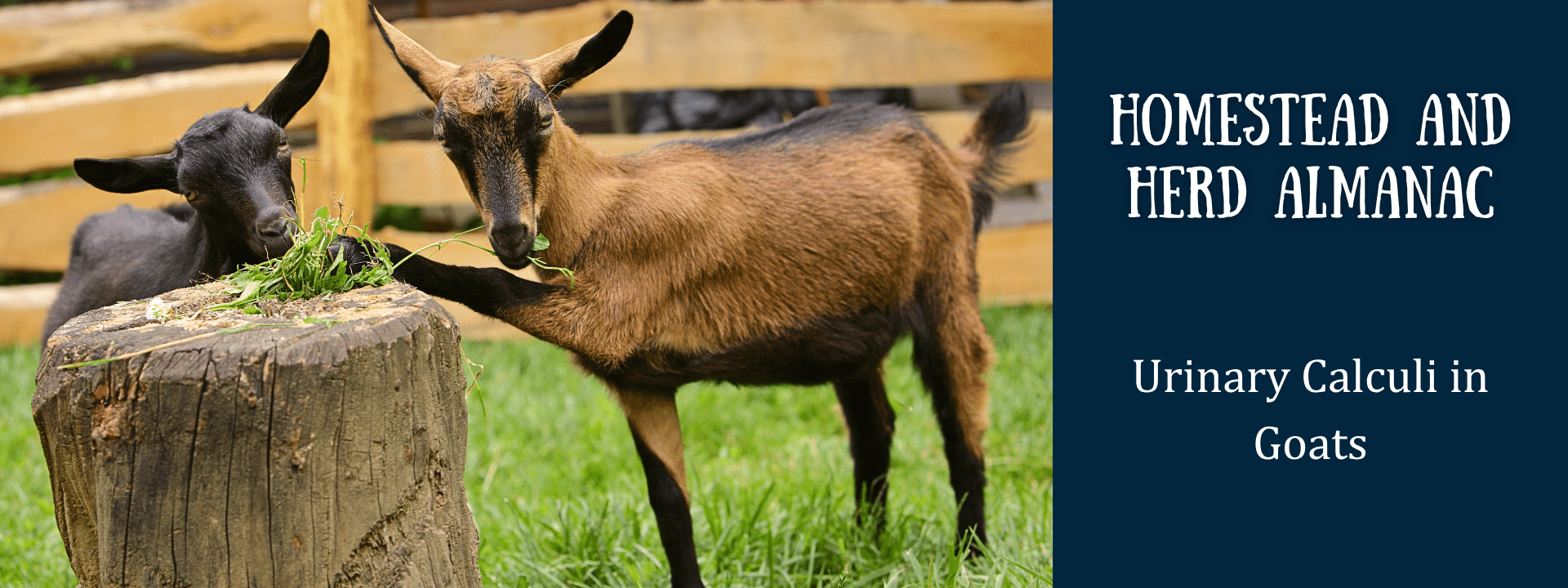
Urinary Calculi in Goats: Understanding, Preventing, and Detecting a Deadly Condition
Urinary Calculi – also called “water belly” or “kidney stones” – is a serious and often fatal condition in mal goats. It occurs when mineral salts form solid stones in the urinary tract, blocking the flow of urine. Because the male urethra has narrow twists and turns, especially in wethers, passing even small stones is difficult and sometimes impossible. Without prompt treatment, urinary calculi can kill an animal in a matter of hours.
Cause and Risk Factors
Urinary calculi is most commonly the result of improper nutrition. The number one factor is an imbalanced calcium-to-phosphorus (Ca:P) ratio in the diet. To maintain normal urinary healthy, goats require a Ca:P ratio of approximately 2.5:1. When phosphorus levels are too high – especially in relation to calcium – the body forms stones that can lodge in the urethra.
Common causes of imbalance include:
- Diets heavy in grain or concentrated feeds
- Feeding improper mineral mixes or not providing minerals at all
- High-phosphorus feed ingredients such as corn
- Low-calcium forage or alfalfa-free diets
- Unknown mineral levels in hay or water
If you are feeding an appropriate mineral supplement and keeping concentrates limited, but problems persist, it is wise to have both your hay and water tested for mineral content.
Animals at Highest Risk
Show animals and young wethers are especially prone to urinary calculi. Producers often overfeed grain to achieve rapid growth and heavy muscling, unintentionally pushing phosphorus intake too high.
Castration also plays a role. When young males are wethered early, testosterone production stops and the urethra does not reach full diameter. A narrow urethra increases the likelihood that stones will lodge and block urination. Delaying castration can significantly reduce risk, allowing more time for proper urethral development.
Feeding grass hay rather than grain-heavy diets also supports prevention by helping maintain a proper mineral balance.
Symptoms to Watch For
Urinary calculi requires immediate veterinary attention. Do no wait – once the urethra is fully blocked, the bladder can rupture, and death quickly follows.
Common signs include:
- Restlessness, anxiety, or depression
- Tail twitching
- Straining to urinate with little or no output
- Dribbling urine
- Pawing at the ground
- Teeth grinding (pain indicator)
- Hunched posture
- Swelling along the belly or under the tail
A Critical Warning
Never force an animal with suspected urinary blockage to drink water. If the goat cannot urinate, increasing fluid intake will only build pressure behind the obstruction. Once the bladder ruptures, the condition is fatal and cannot be repaired.
Prevention at a Glance
To dramatically reduce the risk of urinary calculi:
- Maintain a 2.5:1 calcium-to-phosphorus ratio
- Provide a high quality, goat specific mineral
- Limit grain and show rations
- Feed grass hay as the main roughage
- Delay castration when possible
- Test water and hay if problems occur
- Keep fresh water available at all times (for healthy animals)
Urinary calculi is preventable in most herds through proper nutrition and management. By paying close attention to the Ca:P ratio, avoiding excessive concentrates, and understanding risk factors, producers can protect their animals from this painful and life-threatening condition.
